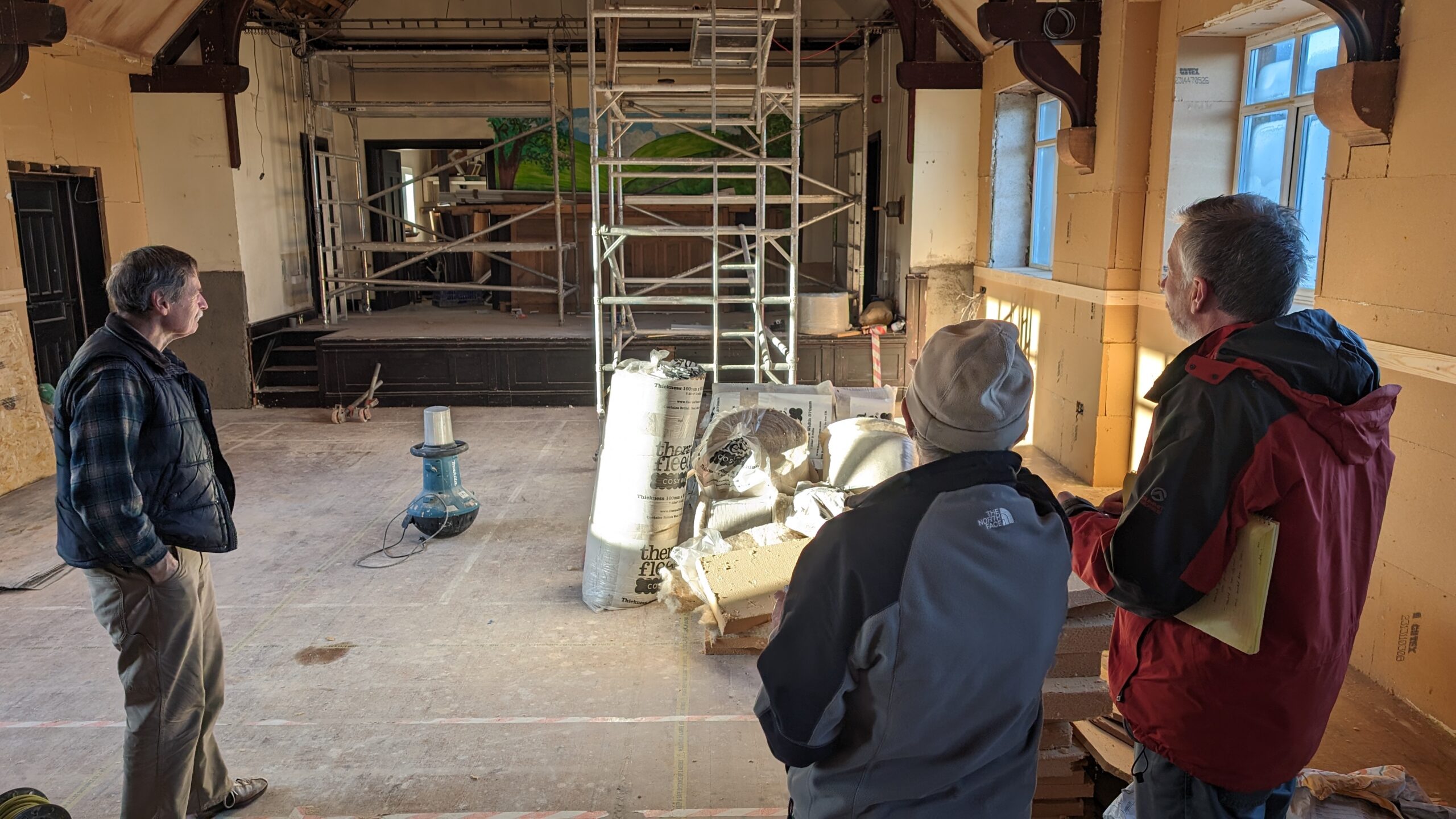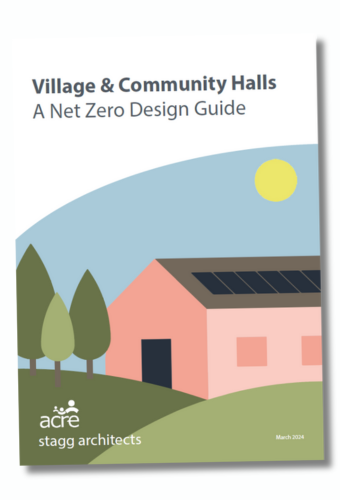Net Zero design guidance published to mark the start of Village Halls Week 2024
18 March 2024
Volunteers managing England’s 10,000+ rural community halls are being encouraged to ‘go green’ as part of the nationwide campaign which begins with a focus on what can be done to improve the energy efficiency of their buildings
Guidance published today by Action with Communities in Rural England (ACRE) outlines what can be done to improve the energy efficiency of village halls, featuring several pioneering communities that have sought to decarbonise their building and reduce bills by improving insulation, replacing heating systems and generating their own energy.
The resource has been authored by Ben Stagg, Director of stagg architects who approached the charity last summer with an offer of help, conscious that many community venues were struggling with increasing energy bills.
Ben said, “It has been a privilege to work with ACRE over the past few months and meet many forward-thinking, determined volunteers who have demonstrated the possibilities for retrofitting these important but often outdated rural community buildings – identifying the most appropriate improvements, securing funding, and managing works. I hope that the guidance published today will inspire and give confidence to many more village hall groups that it’s possible to make their building a warm and welcoming space, reduce energy bills and contribute to Net Zero.”
One case study featured is the refurbishment of Skelton Toppin Village Hall, a characterful but cold stone and wood panelled building built in 1923 serving a remote Cumbrian community seven miles from Penrith. Having secured over £200k from ten different grant funders, the volunteer management committee is undertaking an ambitious programme of refurbishment focused on decarbonisation which has included installation of roof and wall insulation, and the replacement of an old oil-fired boiler with infrared heating panels that are partly supplied by roof-mounted solar PV. It is intended the improvements will reduce energy bills and increase community use of the venue once finished.
Publication of the design guidance marks the beginning of Village Halls Week, an annual campaign that aims to raise the profile of village halls and celebrate the contribution they make to rural community life. The theme this year is ‘go green!’ which is examining the contribution that village halls can play in the transition to Net Zero.
Deborah Clarke, ACRE’s Village Halls Manager said, “We decided to focus on the theme of ‘go green’ for this year’s campaign because the volunteer committees managing these community buildings have been hard hit by increasing energy bills over the past couple of years. That, combined with growing awareness of the need to find local solutions to the climate emergency led us to think about the role village halls can play in supporting a transition to Net Zero in rural areas. Over the next few days, we will be encouraging halls to think about how they can rise to this challenge, whether that be making improvements to their building, providing a space for other environmentally minded groups, or creating green spaces.”
The campaign has gathered interest over the seven years it has been running, with over 250 halls planning on holding local events and open days across England and many more looking to get involved on social media. It will get underway with a livestream launch event today at which the design guide is being introduced, followed by an opportunity for viewers to ask questions of a panel comprising some of the halls featured.
All of the case studies featured in the design guide received recent grants towards building work through the Village Hall Improvement Grant Fund or the current Platinum Jubilee Village Halls Fund made available by Defra. An uplift of £5m to this fund was announced by the Chancellor in the recent Spring Budget.
ACRE is thankful to Baxi, Fakro, Heatable, Herschel Infrared Ltd, Knauf Insulation, Selectaglaze, Utility Aid, and Zolb EV for sponsoring the design guidance. These companies were chosen as partners as they offer specialist solutions that may be suitable for village hall retrofit projects. Their products and services are featured in the publication.
Notes to editors
Press contact: Phillip Vincent, 01285 425645, p.vincent@acre.org.uk
Village & Community Halls: A Net Zero Design Guide is available for free from: https://acre.org.uk/village-halls-net-zero-guide/
ACRE (Action with Communities in Rural England) is a charity speaking up for and supporting rural communities. It is the national body of the ACRE Network, England’s largest rural grouping of charities which facilitate a wide range of community-led initiatives that encourage a culture of volunteering and mutual aid, reduce social isolation and loneliness, increase the supply of affordable housing, boost the local economy, and reduce impact on the environment.
Stagg Architects who produced the guide are an experienced architectural studio dedicated to giving new life to buildings through creative re-use, extension and optimisation. They help clients address climate change through contemporary low-energy design, low-carbon retrofit solutions, and renewable technologies.






